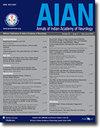Unveiling Distinctive MRI Characteristics in the Diagnosis of GFAP Astrocytopathy: A Rare Autoimmune Neuroinflammatory Disorder.
IF 1.9
4区 医学
Q3 CLINICAL NEUROLOGY
Annals of Indian Academy of Neurology
Pub Date : 2024-05-01
Epub Date: 2024-06-10
DOI:10.4103/aian.aian_1134_23
引用次数: 0
Abstract
Glial fibrillary acidic protein (GFAP) astrocytopathy is a rare autoimmune inflammatory disorder affecting the central nervous system, involving the meninges, brain parenchyma, and spinal cord. The distinctive radiologic feature observed on magnetic resonance imaging (MRI) is characterized by periventricular radial and linear contrast enhancement. This case report details a 45-year-old male who initially exhibited constitutional symptoms, followed by encephalitis, lower limb weakness, and urinary retention. The MRI findings revealed meningoencephalitis with longitudinal extensive myelitis. Notably, the cerebrospinal fluid analysis confirmed the presence of anti-GFAP antibodies.
揭示诊断 GFAP 星形细胞病的独特 MRI 特征:一种罕见的自身免疫性神经炎性疾病
摘要:胶质纤维酸性蛋白(GFAP)星形胶质细胞病是一种影响中枢神经系统的罕见自身免疫性炎症性疾病,可累及脑膜、脑实质和脊髓。磁共振成像(MRI)观察到的显著放射学特征是脑室周围放射状和线状对比度增强。本病例报告详细描述了一名 45 岁的男性患者,他最初表现出全身症状,随后出现脑炎、下肢无力和尿潴留。核磁共振成像结果显示他患有脑膜脑炎和纵向广泛脊髓炎。值得注意的是,脑脊液分析证实存在抗GFAP抗体。
本文章由计算机程序翻译,如有差异,请以英文原文为准。
求助全文
约1分钟内获得全文
求助全文
来源期刊

Annals of Indian Academy of Neurology
Nervous System Diseases-
CiteScore
2.20
自引率
11.80%
发文量
293
审稿时长
29 weeks
期刊介绍:
The journal has a clinical foundation and has been utilized most by clinical neurologists for improving the practice of neurology. While the focus is on neurology in India, the journal publishes manuscripts of high value from all parts of the world. Journal publishes reviews of various types, original articles, short communications, interesting images and case reports. The journal respects the scientific submission of its authors and believes in following an expeditious double-blind peer review process and endeavors to complete the review process within scheduled time frame. A significant effort from the author and the journal perhaps enables to strike an equilibrium to meet the professional expectations of the peers in the world of scientific publication. AIAN believes in safeguarding the privacy rights of human subjects. In order to comply with it, the journal instructs all authors when uploading the manuscript to also add the ethical clearance (human/animals)/ informed consent of subject in the manuscript. This applies to the study/case report that involves animal/human subjects/human specimens e.g. extracted tooth part/soft tissue for biopsy/in vitro analysis.
 求助内容:
求助内容: 应助结果提醒方式:
应助结果提醒方式:


